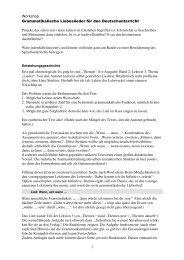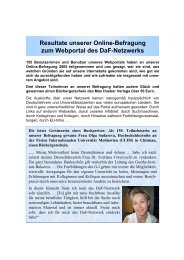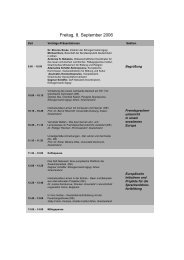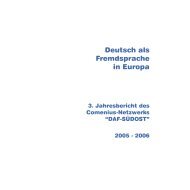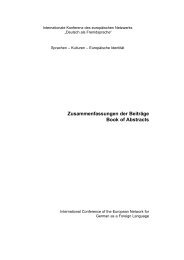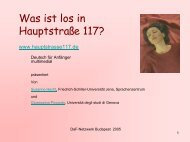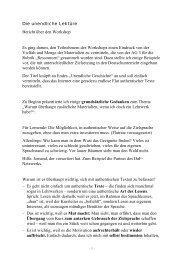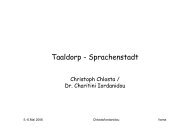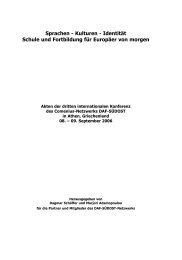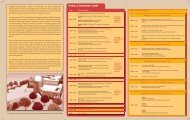Fremdsprache Deutsch Europäisch - DaF Netzwerk
Fremdsprache Deutsch Europäisch - DaF Netzwerk
Fremdsprache Deutsch Europäisch - DaF Netzwerk
Erfolgreiche ePaper selbst erstellen
Machen Sie aus Ihren PDF Publikationen ein blätterbares Flipbook mit unserer einzigartigen Google optimierten e-Paper Software.
II. Internationale Konferenz des <strong>DaF</strong>-<strong>Netzwerk</strong>s<br />
Although collaboration in the Modern Languages-domain offers opportunities many of the<br />
school based ICT projects on foreign language learning so far have concentrated on training<br />
of basic educational use of ICT in the foreign language classroom.<br />
Meanwhile, innovative trends in modern languages teaching pedagogy, inspired<br />
by Second Language Acquisition (SLA) research, support a move away from<br />
structural views of language and related instructional models and towards<br />
more constructivist, sociocultural approaches such as (post) communicative,<br />
collaborative and content and task-based language learning (Nunan, 2004: 6-16).<br />
Also, with the accompanying focus on the development of learner autonomy, an awareness is<br />
developing of the need to address the potential of informal learning experiences.<br />
This calls for a different use of computers as the effectiveness of the computer’s traditional<br />
tutorial role is restricted to the training of form focussed issues and memorization support<br />
(vocabulary, language chunks, grammar patterns).<br />
And –even more important – it will greatly change the role of the teacher. As also Fitzpatrick<br />
(2003) points out ‘ … it is necessary to move away from a ‘top down’ approach, which implies<br />
a uni-directional transfer of information from the teacher to the learner, to new pedagogical<br />
models which prepare them for co-operative, collaborative and life-long learning.’<br />
Various didactical procedures and related formats (e-Tandem, WebQuest) and educational<br />
use of specific ICT-applications (Chat, MOO, WebLog) have been documented (cf. inter alia<br />
Pellettieri, 2000; Shield, 2003; Campbell, 2003) supporting approaches that integrate the use<br />
of Internet and/or involve language learning activities based on communication and collaboration<br />
between distributed language learners.<br />
The relative ease of implementation of the WebQuest format has led to a rapidly growing<br />
number of pioneer schools and individual teachers that have adopted this way of integrating<br />
the use of Internet in their subject teaching. There are initiatives to customise the use of<br />
WebQuests specifically for language learning by developing criteria for task design to optimise<br />
effectiveness. See e.g. the TalenQuest project (Koenraad & Westhoff, 2003).<br />
And the inclusion of dissemination activities on concepts and strategies involved in<br />
LanguageQuest and educational weblogging by the European Centre for Modern Languages<br />
in its 2nd Medium-term programme (2004-2007) 6 can be seen as an acknowledgement of the<br />
relevance of these formats for foreign and second language learning and teaching.<br />
In our view these formats are specifically suitable to support collaborative and content and<br />
task-based approaches. And –at the time of the project definition - for each enough professional<br />
literature was available to warrant inclusion and further exploration.<br />
Although there are studies that demonstrate the feasibility of project work in networked language<br />
classes (see e.g. Warschauer, 1995; Donath & Volkmer, 2000; Felix, 2003) there is still<br />
comparatively little documentation of experiences and the related pedagogy in mainstream<br />
education. Among other impediments, the lack of teacher and teacher educator competencies<br />
at designing learning arrangements using web based tools and platforms is seen as a possible<br />
cause (Bonnet, 2002; Koenraad et al., 2003).<br />
Besides, this scarcity of installed practice in mainstream education impacts heavily on the<br />
preparation of the next generation of teachers. Student teachers have, generally speaking, not<br />
experienced this way of working in secondary education or, for that matter, in their role as<br />
6 For more information on this programme see these ECML pages http://www.ecml.at/mtp2/mtp2.asp<br />
143



